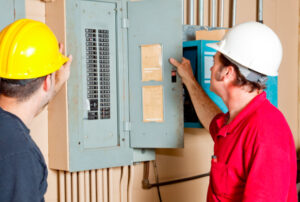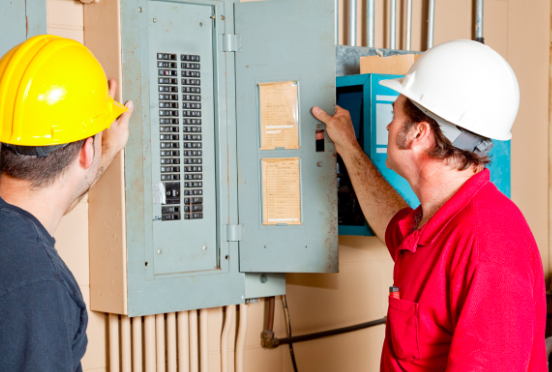 Electricity runs behind the scenes in our homes, providing us with one of life’s most important and taken-for-granted amenities. But, like everything else, electrical wiring can deteriorate over time.
Electricity runs behind the scenes in our homes, providing us with one of life’s most important and taken-for-granted amenities. But, like everything else, electrical wiring can deteriorate over time.
An electrical safety inspection on your property can prevent potential problems that could lead to serious consequences. It also ensures that you comply with local regulations and standards. Visit https://www.ampi-electricinc.com/boca-raton-electrician/ for professional help.
During the electrical safety inspection, the electrician will look at the wiring in your home to ensure that it is up to standard. Wires not up to standards can be dangerous and potentially cause fire hazards in your home. Luckily, following some basic rules can ensure your wires are up to standard.
For starters, always use only approved wiring types and sizes. Different wiring types have different properties and ratings; some types are better suited for certain uses than others. For example, copper wires can withstand higher temperatures than aluminum wires. Moreover, copper is less likely to conduct heat than aluminum wire, which makes it an ideal choice for high-temperature applications.
Another thing to keep in mind is that all electrical wires should be properly labeled and marked. This will help you identify and differentiate them if you ever need to replace them. Generally, a wire or cable’s insulation or outer sheath will contain important information such as its manufacturer’s name, UL or other safety certification marks, voltage rating, size of the wires inside it, and its intended use.
Faulty wiring and frayed cords can pose a significant risk of electric shock, especially if they are left unchecked for too long. That’s why it’s vital to regularly inspect your electrical wires and equipment for signs of wear and tear.
Outlets
There are outlets (more correctly called receptacles) throughout your house which serve different purposes. For instance, some outlets are used for powering your appliances, while others are used for lighting. During your electrical safety inspection, the inspector will check that all of your outlets are functioning properly. This includes ensuring they aren’t overheating and all the wires inside them are covered.
Inspectors will also ensure that the receptacles are at the proper height, based on local codes. This will make it difficult for children to access them and prevent them from accidentally plugging something into an outlet that shouldn’t be plugged in. They will also check that all receptacles are grounded and have GFCI outlets where they should be.
If you’re concerned about your home’s safety, schedule an electrical safety inspection today. It’s a great way to protect your family and your most valuable investment. Then, you can rest easy knowing that your electrical system is tip-top. And if there are any problems, you’ll have the knowledge and information to fix them immediately. In the meantime, remember to practice good safety habits by listening for strange sounds, touching outlets to see if they’re hot, and smelling bad smells. If you notice any of these things, shut off your power at the breaker box and contact a qualified electrician immediately!
Switches
Switches are used to control the flow of electricity in a circuit. They are typically made up of a metal body, a plastic or rubber terminal, and a screw or pin plunger that can be pressed in and out to change the current flowing through the switch. Safety switches are used in circuits to prevent electrocution and fires by ensuring that current flows only in the direction it is intended to go. They also ensure that circuits are properly grounded.
Switches should be installed in a dry location to protect the contacts, actuator, and switch bodies from splashing or spurting oil or water. They should also be protected from accumulated cutting debris and dust that can cause the contacts to become distorted. Switch durability varies greatly with switching conditions. It is important to test a switch in its actual application to determine its durability.
If you suspect that your switch is faulty, look for signs of burning or scorching around the contact area. If you smell a burning smell, turn off all electrical devices in the affected room or area and call an electrician for an electrical safety inspection. Often, the problem with a switch is not immediately apparent and can cause serious damage if left unchecked. An electrical safety inspection will ensure that your switch is in good working condition and can safely carry out its function. Performing an electrical safety inspection can also save you money by preventing fires and other expensive damage to your property.
Circuit Breakers
The breaker box in your home contains a series of lever-operated circuit breakers that protect the wiring in your house. These are designed to “trip,” or shut themselves off at predetermined amperage loads (that’s why there are different size breakers in the panel), to safeguard against electrical fire and injury. This is their sole responsibility.
When the breaker in your breaker box trips, it simply means that you have applied more current than the system is able to handle. This can happen in several ways:
If you’re thinking about purchasing a pre-owned home, it is a good idea to insist on an electrical safety inspection before finalizing the purchase. This will give you a clear picture of the state of the house’s electrical installations and allow for any upgrades to be carried out.
During renovations, many homes suffer damage to their electrical systems due to improper workmanship or the use of poor-quality parts. This can result in a short circuit, which can be six times as dangerous as a normal electrical current and may cause fires, electric shocks, and injuries. An electrical safety inspection will reveal the problem and help prevent further damage.
RCDs
Often called RCDs, residual current devices are one of the most important electrical safety appliances you can have in your home. They constantly monitor the flow of electricity to and from your wiring, and if they detect that the electricity is going down an unintended path (like through you when you touch something live), they will switch off the circuit very quickly, significantly reducing the chance of a serious electric shock. RCDs are especially handy in damp areas of the house where you might be using electrical equipment and in your garden where there are electrical fittings like lights and sheds.
A professional electrical safety inspection can also reveal whether or not your switches, outlets, and circuits are overloaded with too much energy demand. This can be the result of DIY electrical work by non-licensed electricians or just aging wires that have been unable to cope with the load.
In these cases, an electrical safety inspection can reveal faulty installations and identify dangerous work practices or equipment. Your licensed electrician can then help you rectify the issues that have been highlighted so that your family and property are safe from potential electrical hazards.
Smoke Detectors
Smoke detectors play a crucial role in keeping families safe from the ravages of house fires. They are one of the most effective home safety appliances, but they are often overlooked when it comes to regular maintenance and care. If you have a smoke detector that has been damaged or painted over, is not functioning properly, is prone to false alarms, or doesn’t sound like it should, these are all reasons why it may be time to replace it.
There are two main types of smoke detectors: ionization and photoelectric. Ionization smoke detectors use small amounts of radioactive material (in quantities so tiny they pose no health risk) to ionize the air molecules between a pair of electrodes in the detection chamber. Smoke particles attach to ions and diminish the flow of current, triggering an alarm circuit.
Alternatively, photoelectric smoke detectors contain a source of infrared, visible, or ultraviolet light and a sensor. The reflected light from the air is measured by the sensor, and the alarm circuit is triggered if the light intensity drops due to the presence of smoke particles.
A professional electrician can help you decide which type of smoke detector is best for your property. They can also check that your smoke detectors are interconnected (via wiring or wirelessly) and are in the correct locations. This will ensure that if one smoke detector detects a fire, all the alarms on your property will sound simultaneously.

